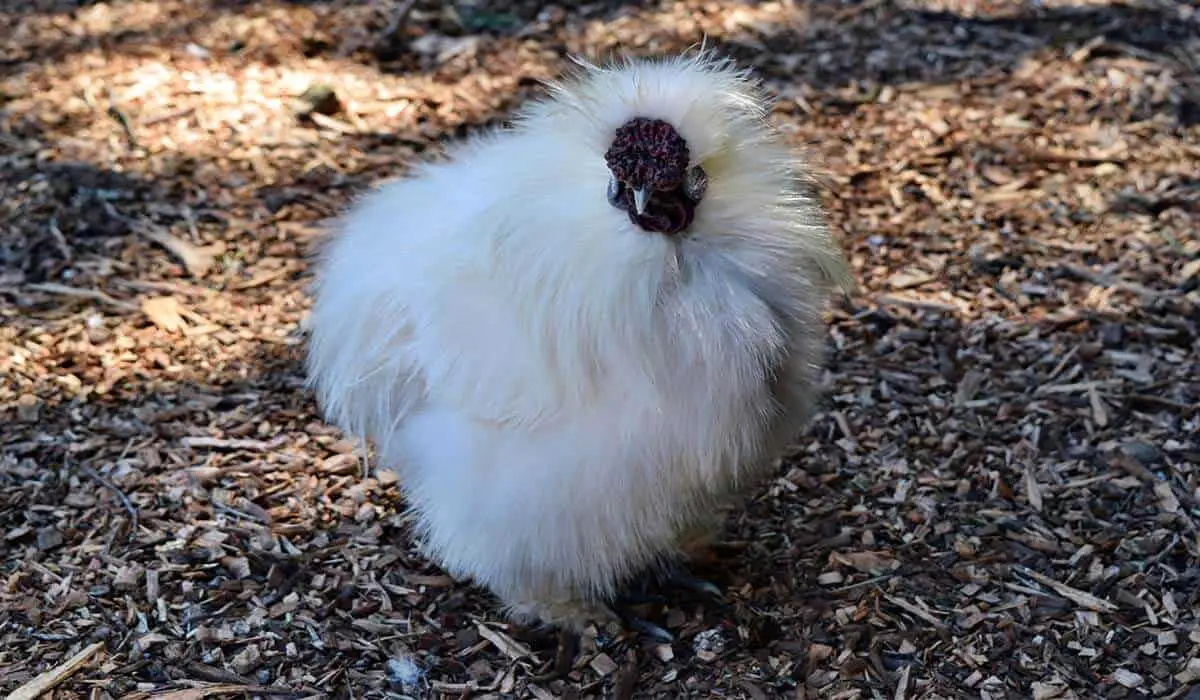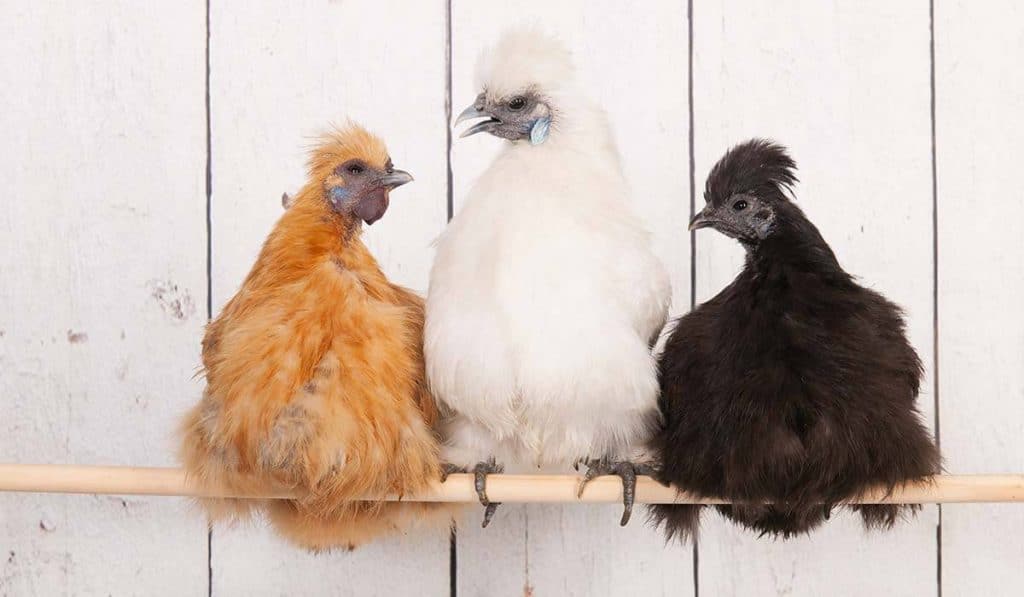These fluffy chickens are known for their satin-smooth plumage, blue earlobes, and black skin. But appearance isn’t the only thing these chickens have: the silkie sports a rather interesting behavior, especially when it comes to sleeping habits.
As a chicken owner, you might have some questions about that. How do silkies sleep? Do silkies sleep on the ground? Silkies prefer to sleep on the ground, even if they have a place to roost up high. They still need a place to roost, because it provides them a place to shield themselves, stay warm, and keep safe from parasites.
Today, we’re going to answer all of your inquiries. Let’s get to it!

How Do Chickens Sleep at Night?
Chicken sleep isn’t something you’d expect to be interesting, but, it is. Did you know that chickens dream, just like humans do? They experience REM (rapid eye movement) sleep, which is dream time. However, it only occurs for a few seconds.
Here’s a big surprise: chickens are able to make decisions as to whether they keep half of their brain awake. This happens often when they’re in a risky situation. If it’s safe, they’ll usually let the two halves sleep.
Yet, a roost is the one big behavioral defining aspect of chickens. Silkies especially prefer to roost together and fluff out—but before we get into that, what is roosting, exactly?
What Is Chicken Roosting?

A roost is simply a branch or an elevated bar. Chickens use roosts to perch on and sleep. It’s instinctive: they seek out elevated areas to shield themselves from potential predators.
Roosts protect silkies from external parasites. They also help keep chickens from lying in their own droppings.
Roosting is especially preferred during the winter months. During the colder seasons, your silkie is going to be up there all night long with her flock mates.
How High Should a Roost Be?
This small matter usually depends on your flock. However, roosting perches should be around 3 feet high.
If you want to be extra-accommodating, you could add a small lower perch for the older chickens. A big jump can be a bit tough on their feet, so you might want to make it easy for them. It’s also very important for arthritic hens.
Small birds and bantams are big fans of high roosts. In their case, it’d be best if you put the roost as far up for the chicken as they can reach. You’d be impressed by how high they can fly to these roosts.
There are some people out there who keep their roosts up as elevated as 5 feet. Basically, as long as they’re clean, and as long as the birds can use them, it’s alright.
Pecking Order & Roosting
The pecking order plays a big role in roosting. For example, hens that are high in the pecking order get the highest spot on the roost. You can find these top-ranking hens in the middle of the line, usually with subordinates on the outside.
Now, there’ll be two hens on each end. Both of them will sleep with one eye open, looking out for potential dangers. Sounds exhausting? Well, these two hens will turn around periodically, so that they can rest.
Do Silkies Sleep on the Floor?
Here’s the answer to your question: yes. Silkies do, in fact, sleep on the floor. Most silkies don’t roost. They sleep in a pile on the floor.
It’s always preferable for hens to roost rather than sleep on the floor. The ground isn’t exactly sanitary, after all: droppings can be annoying to deal with, mice might run wild, and critters might live among all the litter. Most importantly, sleeping on the floor makes your chickens easy targets.
All of that is not to say that all silkies sleep on the ground. Some of them can roost! It’s just that the perch has to be no more than a foot or so above the ground. This helps them reach it more easily. Of course, if the roost isn’t clean, or if it’s infested with mites, your silkie might stop using it.
Why Silkies Sleep on the Floor
Sleeping on the floor isn’t obviously an ideal option. So why do silkies do it?
Silkies aren’t exactly the brightest of birds. They take time to learn, especially if they aren’t around smarter birds to aid them. Moreover, silkies aren’t good at flying; this is a result of the shredded nature of their wing feathers, which doesn’t catch much air.
On top of that, silkies sometimes can’t see that well. This little obstacle is due to the crest on their head, which makes perching hard.
Can Silkies Climb Ladders?
As we’ve previously learned, most silkies can’t get to the roost on their own. To overcome this, some people use ladders.
“Ladders? How?” Well, a roost with an adequate ladder system might do the trick.
A lot of people will argue that silkies dislike ladders. But can they climb them? We’d say some of them can. Of course, it’d be best if you set your ladders at the appropriate angles. These ladders shouldn’t be steeper than 45 degrees. Ideally, they’d be closer to 30.
All chickens can climb ladders, but it may take some training.
Your silkie probably won’t climb the ladder right away. We’d suggest gently putting the chickens up a few times and letting them figure things out. This way, they might use the ladder on their own.
However, you should keep in mind that your silkie might never use a ladder. In the end, the whole thing depends on your chicken.
What Do Silkies Eat?
With the right food, your silkies will not only be happy, but healthy. They’ll also be less likely to require visits to the vet. But would their nutrition affect their sleep? Let’s see.
Of course, how much you feed your chicken depends on the size of the flock. Generally speaking, it’d be best if you’d feed your silkies through feeders and free-range scattering.
There are a lot of ways to supply your chickens with a healthy diet. One of them is to put layers of pellets in the feeders, but also add some grit. This helps with digestion. However, you might not need it if your chickens are spending most of their time running outside.
To finish off, scatter some grain-based food in your chicken’s enclosure. Don’t worry too much about rations! A lot of the advice floating around are directed towards poultry farmers, who seek specific results in the meat or eggs. If you’re just breeding your hens, then you don’t need to over-complicate matters.
What Should I Feed My Silkies to Make Them Sleep Better?
Now that you have a general idea of silkie food, we’re getting knee-deep into the details.
Grit
Fun fact: chickens don’t have teeth! That means they can’t chew food. Luckily for them, they swallow food down into something called the “gizzard”: an organ that grounds food by grit.
Some free-range chickens eat grit they find on the ground. However, if your chickens aren’t the roaming type, you might want to supply them with some grit. You shouldn’t worry about portions, either; silkies are unlikely to overeat.
Grains
Chickens love wholegrain: oats, barley, wheat. These are all excellent options for them. So is maize.
Don’t hesitate to scatter these foods on the ground for your silkies. However, don’t overfeed them! An overdose of grain could fatten your chicken.
Protein
If you’re looking for protein, then you’re looking for layer pellets. It supplies your chicken with the skin of protein it needs to make eggs and grow.
When your chicken starts molting, it’ll need extra protein. What better way to provide it than by scattering cat kibble? It’ll help produce feathers and keep your chicken happy.
Greens
Chickens need lots of greens. Are your chickens free-range? If they’re, then try to keep them from your cabbage patch! They’ll nibble at anything green: weed, cabbage, cauliflower. You should let them have it, as their diet requires it.
Treats
Here are two things silkies love like no other: mealworms, and corn. There are plenty of store-bought chicken treats with these ingredients. With them, you’ll earn your chickens’ love and obedience.
Conclusion
Although it doesn’t seem very comfortable, some silkies do in fact sleep on the ground. They often sleep under the perch. Other times they just roost normally.
It really doesn’t matter where they choose to sleep. What matters is cleanliness and hygiene! So if your silkies are sleeping on the ground, make sure that area is litter-free.
Related Articles